Flat Roofs in Georgia: TPO vs Mod-Bit Your Guide to Replacements
December , 2023 | 12 min. read
By Mitch Owens
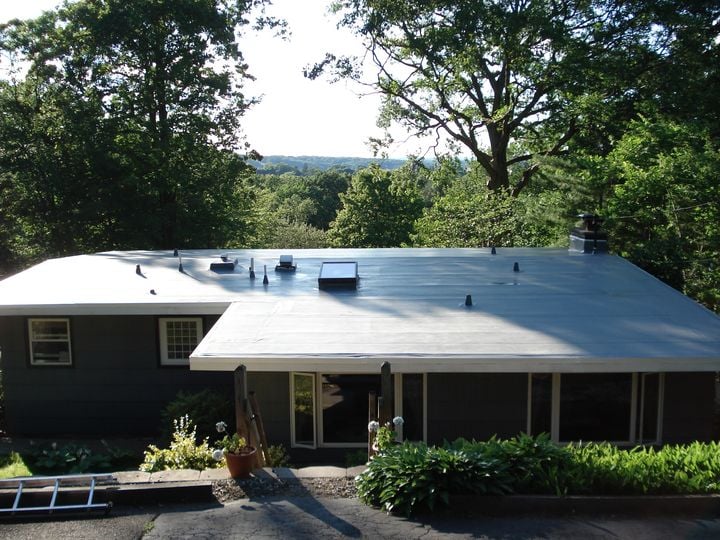
Are you dealing with a troublesome flat roof in Georgia and thinking it’s time for a fix or a complete overhaul?
Struggling to find straightforward advice on flat roof replacements in the Peach State?
We completely understand. Choosing a new roof, especially flat roofs in Georgia, is not straightforward. In your region, you have challenges like hot weather, wind-driven rain, and cost concerns.
But here’s some good news - you're not alone in this. RoofCrafters has specialized in replacing flat roofs in Georgia for 30 years. Roofing might not be the most thrilling topic, but we're passionate about making it easier for you. We’re here to provide all the essential information, helping you make an educated decision about your flat roof replacement. Let's make this journey informative and, dare we say, a little less tedious.
In this comprehensive guide, we'll cover:
- Popular flat roofs for residential homes in Georgia
- The best flat roofs for Georgia's coastal and inland regions
- Insights into Modified Bitumen (Mod-bit) and TPO roofing
- A detailed look at the costs of Mod-bit and TPO roofing in Georgia
Ready to unravel the mysteries of flat roofs in Georgia? Let's jump right in.
Popular Flat Roof Options for Georgia Houses
When it comes to residential architecture in Georgia, flat roofs are more common than you might think. Often chosen for their modern look or functional use of space, these roofs appear on a variety of homes across the state.
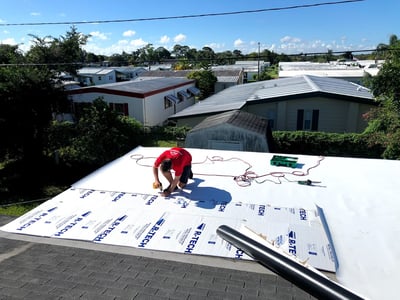
Georgia homeowners have several flat roof options to choose from, each with its own set of benefits:
- Built-Up Roofing (BUR): Comprising many layers of tar and reinforcing fabrics. BUR offers durability and a proven track record.
- Modified Bitumen Roofing (Mod-bit): This roofing combines asphalt with a rubber or plastic polymer. This enhances flexibility and strength, perfect for Georgia’s varying climate.
- Single-Ply Membrane Roofing: Including popular types like TPO, PVC, and EPDM. Single-ply materials are known for their ease of installation and maintenance.
- Spray Polyurethane Foam (SPF) Roofing: Offering insulation and waterproofing. SPF can be a smart choice for energy-conscious Georgia homeowners.
- Green or Vegetative Roofs: While not as common, these environmentally friendly options are gaining popularity in urban areas of Georgia for their aesthetic and ecological benefits.
- Metal Roofing: Durable and long-lasting. Metal roofing can be ideal for coastal areas in Georgia, providing resistance to saltwater corrosion.
- Liquid Applied Roofing and Coating Systems: These options offer flexibility and can be tailored to suit a variety of flat roof needs in Georgia.
Choosing the right type of flat roof for your home in Georgia depends on several factors. Things like climate, aesthetic preference, and budget.
Choosing the Best Flat Roof Material for Georgia's Coastal Climate
Living in coastal Georgia comes with unique environmental challenges. This is especially true when choosing a flat roof for your home. An ideal roof should endure strong winds, heavy rain, and salty coastal air.
Here are some top choices:
- Single-Ply Membrane Roofs (TPO or PVC): These roofing systems are a great fit for coastal Georgia homes. Their UV resistance and flexibility make them capable of withstanding the harsh seaside elements.
- Modified Bitumen (Mod-bit) Roofing: Mod-bit roofing stands out for its resilience against water and wind damage. This makes it a reliable option for homes near the coast.
- Metal Roofing: A reliable choice for coastal areas. Metal roofing combats corrosion caused by salt air and can be an excellent long-term investment.
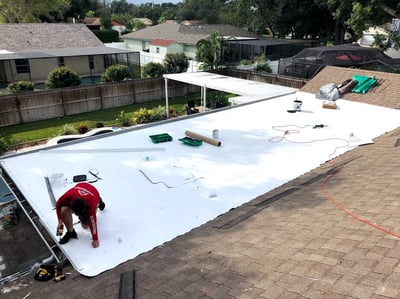
When choosing a flat roof for a coastal home in Georgia, consider the area's weather and environment. To make a good decision for your roof, it's important to talk to a local roofing expert. They understand the challenges and can help you choose what's best for its longevity and protection.
Is a TPO Roof the Best Material for a Residential Home in Georgia?
TPO (Thermoplastic Olefin) roofing is a popular option for residential homes. In most cases, we would recommend TPO roofs to Georgia homeowners. The benefits of using TPO roofing for a residential home include:
- Durability: TPO roofing is made of a thermoplastic material that is highly resistant to UV rays, ozone, and chemicals. Which makes it a great option for areas with intense sun exposure.
- Energy-efficient: TPO roofing reflects the sun's rays, which can help to reduce cooling costs and keep the building cooler.
- Waterproof: TPO roofing is heat-welded together at the seams, which creates a very strong, waterproof seal.
- Variety of colors: TPO roofing systems are available in a variety of colors. Including white, tan, and light gray which are known to reflect the sun's rays and can help to reduce cooling costs.
- Easy to repair: TPO roofing is easy to repair and can be welded together at the seams to fix any leaks or damage.
TPO (Thermoplastic Olefin) roofing is a type of single-ply roofing system that is made of a thermoplastic material. It is a type of roofing membrane that is heat-welded together at the seams, which creates a very strong, waterproof seal. This material is often used on flat and low-sloped roofs. It's prevalent because of its durability and resistance to weathering.
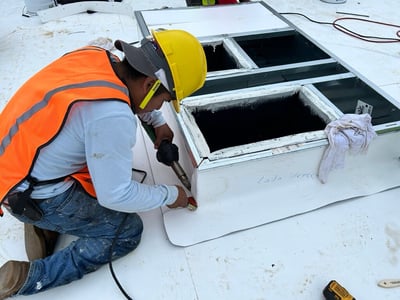
TPO roofing is known for its high resistance to UV rays, ozone, and chemicals, which makes it a great option for areas with intense sun exposure. It also has good resistance to punctures and tears, and it can withstand high winds and heavy rain. Additionally, TPO roofing is energy-efficient. It can help to reduce cooling costs, as it reflects the sun's rays and keeps the building cooler.
TPO Roofing Installation Methods
As mentioned earlier, TPO roofing is available in a variety of colors. It can be installed in several ways too, some of the most common methods are:
- Fully adhered: The TPO membrane gets adhered to the insulation over the roof deck.
- Mechanically attached: The TPO membrane is attached to the roof deck using mechanical fasteners.
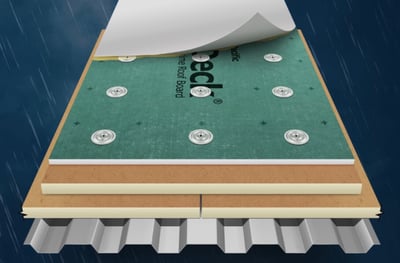
TPO systems have gained a reputation for being durable, weather-resistant, and energy-efficient. This makes them a popular choice for flat and low-sloped roofs on residential homes. Yet, TPO roofing is more expensive than traditional asphalt shingles. Installation requires specialized equipment and trained professionals.
Additionally, TPO roofing does not have the same aesthetic appeal as other roofing materials like Mod-Bit. So it may not match the look of a traditional residential home. Consult a local flat roof contractor. One who is familiar with the specific weather conditions in your area and can recommend the best option for your home.
How Much Does a TPO Roof Cost for a Georgia Home?
The cost of a TPO roof for a residential home will depend on several factors, such as the size of the roof, the materials used, the complexity of the installation, and the location of the home.
On average, a TPO roof can cost anywhere from $6 to $12 per square foot installed, depending on the above factors.
But, it's worth noting that this is just a rough estimate and the actual cost can vary. For a more accurate estimate, getting quotes from at least 2 or 3 local roofing contractors is recommended. They'll be able to provide you with a detailed estimate based on your specific needs and budget. It's also important to note that TPO is a more durable and energy-efficient option. It can last longer and need less maintenance, so in the long run, it could be a cost-effective option.
Is a Mod-Bit the Best Flat Roof for a Residential Home?
A modified bitumen roof (mod-bit) was first used for commercial and industrial buildings. But, it is also used for residential homes. A mod-bit roof can be cheaper than a TPO roof but it won't last as long.
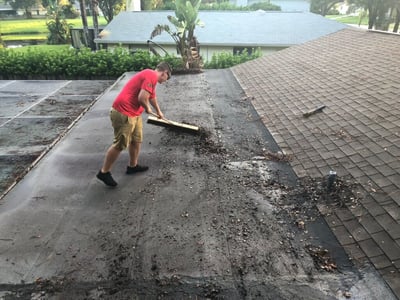
Some of the benefits of using a mod-bit roof for a residential home include:
- Durability: Mod-bit roofs are made of a mixture of asphalt and rubber-like material. This gives them excellent durability and resistance to water and wind damage.
- Longevity: Mod-bit roofs typically last longer than traditional asphalt shingles.
- Easy to install: Mod-bit roofs are relatively easy to install, which can make them a cost-effective option for homeowners.
- Versatility: Mod-bit roofs come in a variety of colors and styles, which can make it easy to find one that matches the aesthetic of your home.
Mod-bit Installation Methods
Mod-bit roofs are installed with two or more layers of asphalt. Also reinforcement materials such as fiberglass or polyester. These are applied using heat, either by torch or hot asphalt and then covered with a protective mineral granule surface. This type of roofing system can be installed in several ways, some of the most common methods are:
- Torch-applied: A gas-fueled torch is used to heat the asphalt and bond the layers together.
- Hot-applied: Hot asphalt is applied to bond the modified with the underlayment which is fastened to the roof deck.
- Cold-applied: Adhesive is used to bond the layers together with a cold layer of asphalt.
- Self-adhered: A layer of adhesive is already applied to the back of the material and it is sticking to the roof deck as it is unrolled
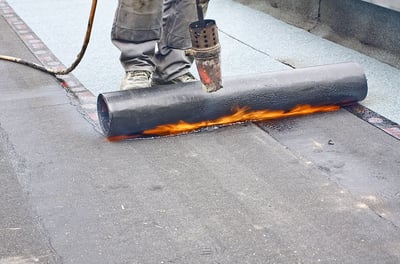
Mod-bit roofing systems are known for durability and resistance to water and wind damage. This makes them a popular choice for flat roofs on commercial and industrial buildings. They also work great on residential installations. We'd recommend Mod-bit when curb appeal is a concern.
How Much Does a Mod-bit Roof Cost for a Residential Home?
The cost of a mod-bit for a residential home will depend on several factors, such as the size of the roof, the materials used, the complexity of the installation, and the location of the home. Depending on the duration you desire extra layers can be added to achieve longer lifespans.
On average, a mod-bit roof can cost anywhere from $5 to $9 per square foot installed, depending on the above factors.
Yet, it's worth noting that this is a rough estimate and the actual cost can vary. For a more accurate estimate, getting quotes from at least 2 to 3 professional flat roofing contractors in your area is recommended. They’ll be able to provide you with a detailed estimate based on your specific needs and budget. It's also important to note that mod-bit roofs are more expensive than traditional asphalt shingles. They can last longer and need less maintenance, so in the long run, mod-bit could be a cost-effective option.
Wrapping Up: Your Guide to Flat Roof Solutions in Georgia
Choosing the right flat roof for your Georgia home or business is more than a construction decision. It's selecting a solution that aligns with your specific needs, climate conditions, and preferences. Throughout this article, we've explored flat roofing options, each with its unique benefits.
At RoofCrafters, we bring over 30 years of expertise in the roofing industry to every project in Georgia. Our commitment to excellence ensures that your flat roof not only meets but exceeds your expectations. We know about Georgia's weather and how it affects roofs, and we're here to help you every step of the way.
So, if you're ready to embark on your flat roofing project or need expert advice, RoofCrafters is at your service. Let us help you make an informed decision that secures and enhances your property for years to come.
My name is Mitch, and I have over 10 years of roofing experience. I enjoy my career in the service industry because I love helping others take care of their homes and businesses. With over 10 years in the roofing industry, my success comes from my honesty and integrity during my roof inspections. I do my best to listen to the needs of my clients and strive to provide an awesome client experience.



